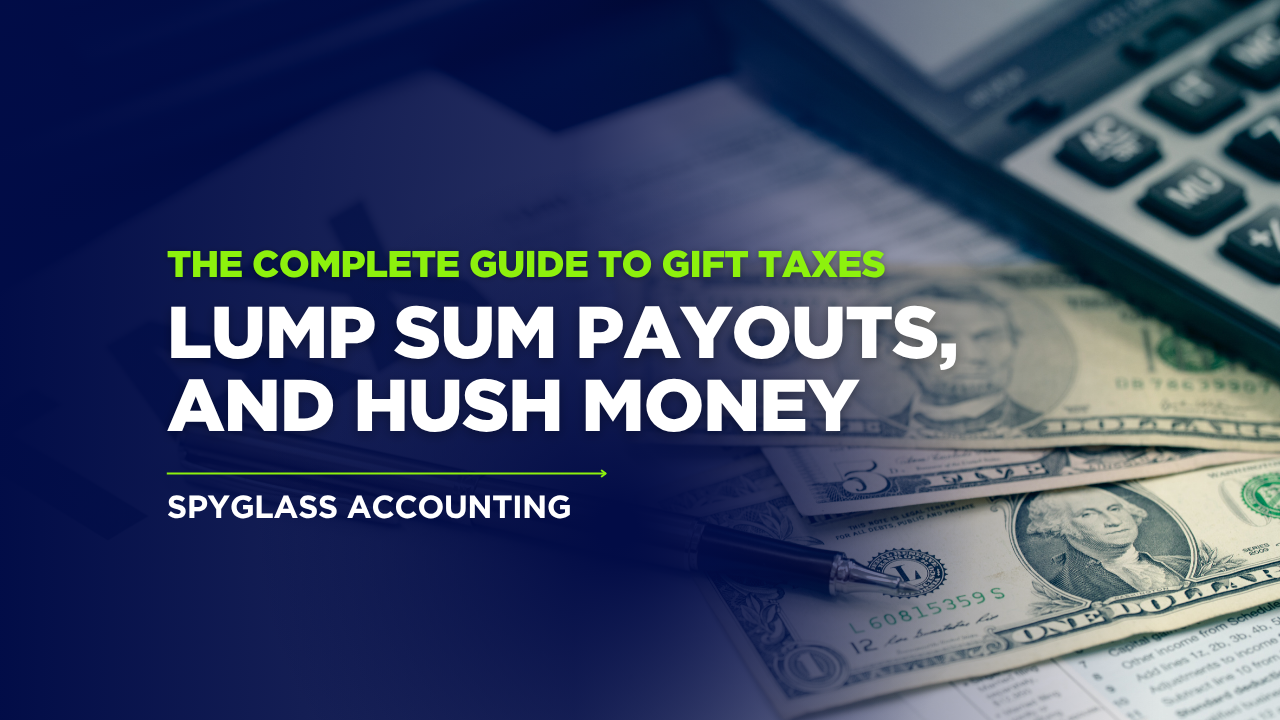
The Complete Guide to Gift Taxes, Lump Sum Payouts, and Hush Money: What the IRS Expects
Introduction: When “Free Money” Isn’t Really Free
Imagine receiving a $5 million payout—only to discover the IRS takes nearly half. This scenario isn’t just TV drama (looking at you, White Lotus). In real life, gift taxes, settlements, and confidential payouts can trigger surprising tax liabilities.
This guide covers everything you need to know about:
✅ Gift taxes vs. taxable income
✅ Lump sum payouts (inheritance, lawsuits, lottery winnings)
✅ Hush money and non-disclosure agreements (NDAs)
✅ IRS reporting rules to avoid penalties

- Gift Taxes: How the IRS Defines “Generosity”
What Counts as a Gift?
The IRS defines a gift as:
- Money, property, or assets
- Given without expecting anything in return
Key Rule: The recipient never pays taxes on gifts. The giver might.
2025 Gift Tax Exclusions
| Category | Amount |
| Annual exclusion per recipient | $19,000 |
| Lifetime exemption (per giver) | $13.99M |
Example: If your parents give you $50,000 in 2025:
- $19,000 = tax-free (annual exclusion)
- $31,000 = applies to their lifetime exemption (no immediate tax)
Exception: Gifts for tuition or medical bills (paid directly to institutions) are 100% exempt.
- Lump Sum Payouts: Inheritance, Lawsuits, and Windfalls
Tax Treatment by Payout Type
| Payout Type | Taxable? | IRS Form |
| Inheritance | Usually no* | N/A |
| Lottery/Prize Winnings | Yes (100%) | W-2G |
| Legal Settlements | Depends** | 1099-MISC |
Notes:
- Inheritance tax only applies in 6 states (PA, NJ, etc.). Federal estate tax kicks in above $13.99M (2025).
- Settlements for physical injury = tax-free. Emotional distress = taxable.
Case Study: A $500,000 lawsuit payout for emotional distress could mean $185,000 in taxes (37% federal + state).
- Hush Money & NDAs: The IRS Always Finds Out
Is Hush Money Taxable?
Yes. The IRS classifies confidentiality payouts as:
- Compensation for services (if tied to employment)
- Other income (if unrelated to work)
Example: A $1M NDA payout reported as “Other Income” on Schedule 1 (Form 1040) could owe $370K+ in federal taxes.

Penalties for Non-Disclosure
- Failure to report: 20% of underpaid tax + interest
- Fraudulent concealment: Up to 75% penalty + criminal charges
Pro Tip: Structured settlements (payments over time) may reduce tax burdens.
- How to Minimize Taxes on Large Payouts
Strategy 1: Gift Splitting
- Married couples can combine annual exclusions ($38K/recipient in 2025).
Strategy 2: Irrevocable Trusts
- Removes assets from your estate (avoiding future estate taxes).
Strategy 3: Charitable Donations
- Offset taxable income by donating appreciated assets (stocks, real estate).
- Real-World Examples
Scenario 1: The “White Lotus” Hush Money
- Payout: $5M
- Classification: Taxable income (not a gift)
- Tax Due: ~$2.4M (37% federal + 11% HI state)
Scenario 2: Inheritance vs. Gift
- $500K from Dad: Tax-free (under lifetime exemption)
- $500K from Boss: Taxable as income (not a gift)
- When to Consult a Tax Professional
Seek expert advice if:
- You receive >$19K from a non-family member
- A payout involves an NDA or legal settlement
- You’re considering trusts or offshore accounts
Spyglass Accounting specializes in high-net-worth tax strategy. Book a consultation.
Key Takeaways
- Gifts are tax-free for recipients (givers may file Form 709).
- Hush money = taxable income (report on Schedule 1).
- Inheritances are usually tax-free (but check state laws).
- Always document large transactions to prove intent (gift vs. payment).
